Reflective Practice: Improving Chronic Illness Management Care Plan
VerifiedAdded on 2023/06/08
|6
|1368
|86
Essay
AI Summary
This essay presents a critical reflection on the skill of preparing care plans for chronic illness management. It begins by identifying the importance of this skill in addressing the high prevalence of chronic illnesses and improving patient outcomes. The author evaluates their own skill in risk assessment, care plan preparation, and monitoring, using an example of managing a diabetes patient. Areas for improvement are identified, specifically in communication skills to enhance patient interaction and collaboration with healthcare professionals. The reflection concludes by highlighting the benefits of effective care plans for both patients, such as faster recovery and self-management education, and the general practice, including improved communication among nursing staff and enhanced patient safety. The author acknowledges the need for continued development in communication to achieve optimal outcomes in chronic illness management.
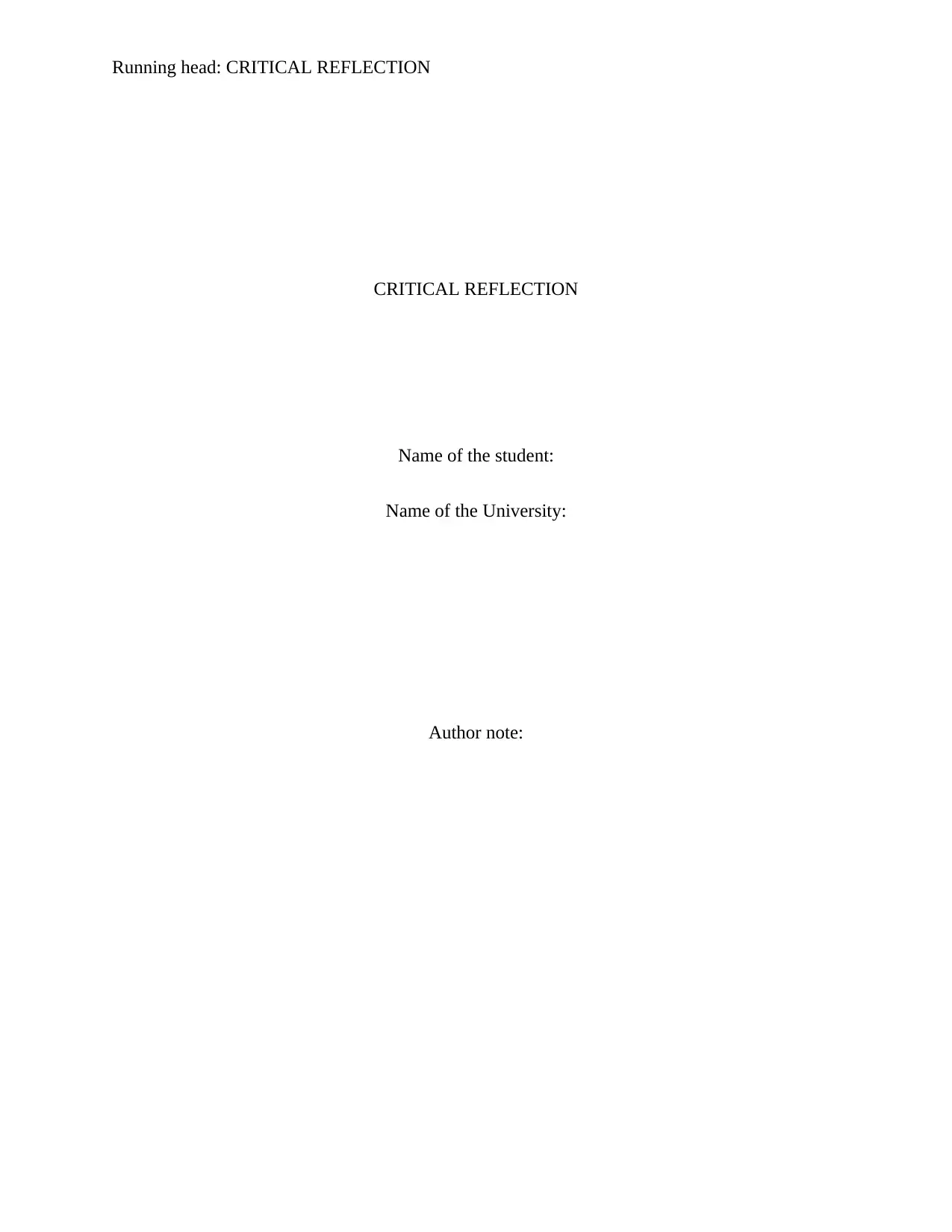
Running head: CRITICAL REFLECTION
CRITICAL REFLECTION
Name of the student:
Name of the University:
Author note:
CRITICAL REFLECTION
Name of the student:
Name of the University:
Author note:
Paraphrase This Document
Need a fresh take? Get an instant paraphrase of this document with our AI Paraphraser
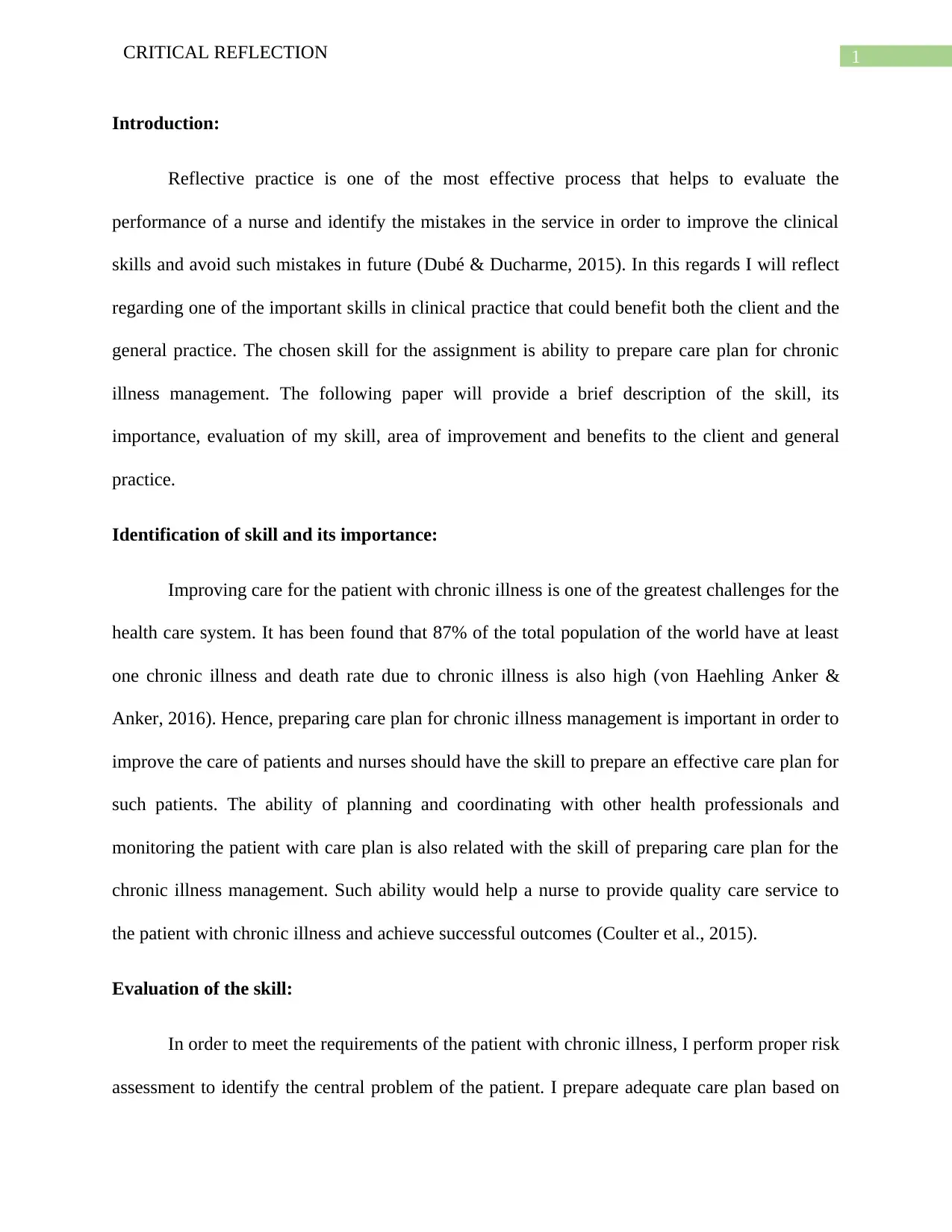
1CRITICAL REFLECTION
Introduction:
Reflective practice is one of the most effective process that helps to evaluate the
performance of a nurse and identify the mistakes in the service in order to improve the clinical
skills and avoid such mistakes in future (Dubé & Ducharme, 2015). In this regards I will reflect
regarding one of the important skills in clinical practice that could benefit both the client and the
general practice. The chosen skill for the assignment is ability to prepare care plan for chronic
illness management. The following paper will provide a brief description of the skill, its
importance, evaluation of my skill, area of improvement and benefits to the client and general
practice.
Identification of skill and its importance:
Improving care for the patient with chronic illness is one of the greatest challenges for the
health care system. It has been found that 87% of the total population of the world have at least
one chronic illness and death rate due to chronic illness is also high (von Haehling Anker &
Anker, 2016). Hence, preparing care plan for chronic illness management is important in order to
improve the care of patients and nurses should have the skill to prepare an effective care plan for
such patients. The ability of planning and coordinating with other health professionals and
monitoring the patient with care plan is also related with the skill of preparing care plan for the
chronic illness management. Such ability would help a nurse to provide quality care service to
the patient with chronic illness and achieve successful outcomes (Coulter et al., 2015).
Evaluation of the skill:
In order to meet the requirements of the patient with chronic illness, I perform proper risk
assessment to identify the central problem of the patient. I prepare adequate care plan based on
Introduction:
Reflective practice is one of the most effective process that helps to evaluate the
performance of a nurse and identify the mistakes in the service in order to improve the clinical
skills and avoid such mistakes in future (Dubé & Ducharme, 2015). In this regards I will reflect
regarding one of the important skills in clinical practice that could benefit both the client and the
general practice. The chosen skill for the assignment is ability to prepare care plan for chronic
illness management. The following paper will provide a brief description of the skill, its
importance, evaluation of my skill, area of improvement and benefits to the client and general
practice.
Identification of skill and its importance:
Improving care for the patient with chronic illness is one of the greatest challenges for the
health care system. It has been found that 87% of the total population of the world have at least
one chronic illness and death rate due to chronic illness is also high (von Haehling Anker &
Anker, 2016). Hence, preparing care plan for chronic illness management is important in order to
improve the care of patients and nurses should have the skill to prepare an effective care plan for
such patients. The ability of planning and coordinating with other health professionals and
monitoring the patient with care plan is also related with the skill of preparing care plan for the
chronic illness management. Such ability would help a nurse to provide quality care service to
the patient with chronic illness and achieve successful outcomes (Coulter et al., 2015).
Evaluation of the skill:
In order to meet the requirements of the patient with chronic illness, I perform proper risk
assessment to identify the central problem of the patient. I prepare adequate care plan based on
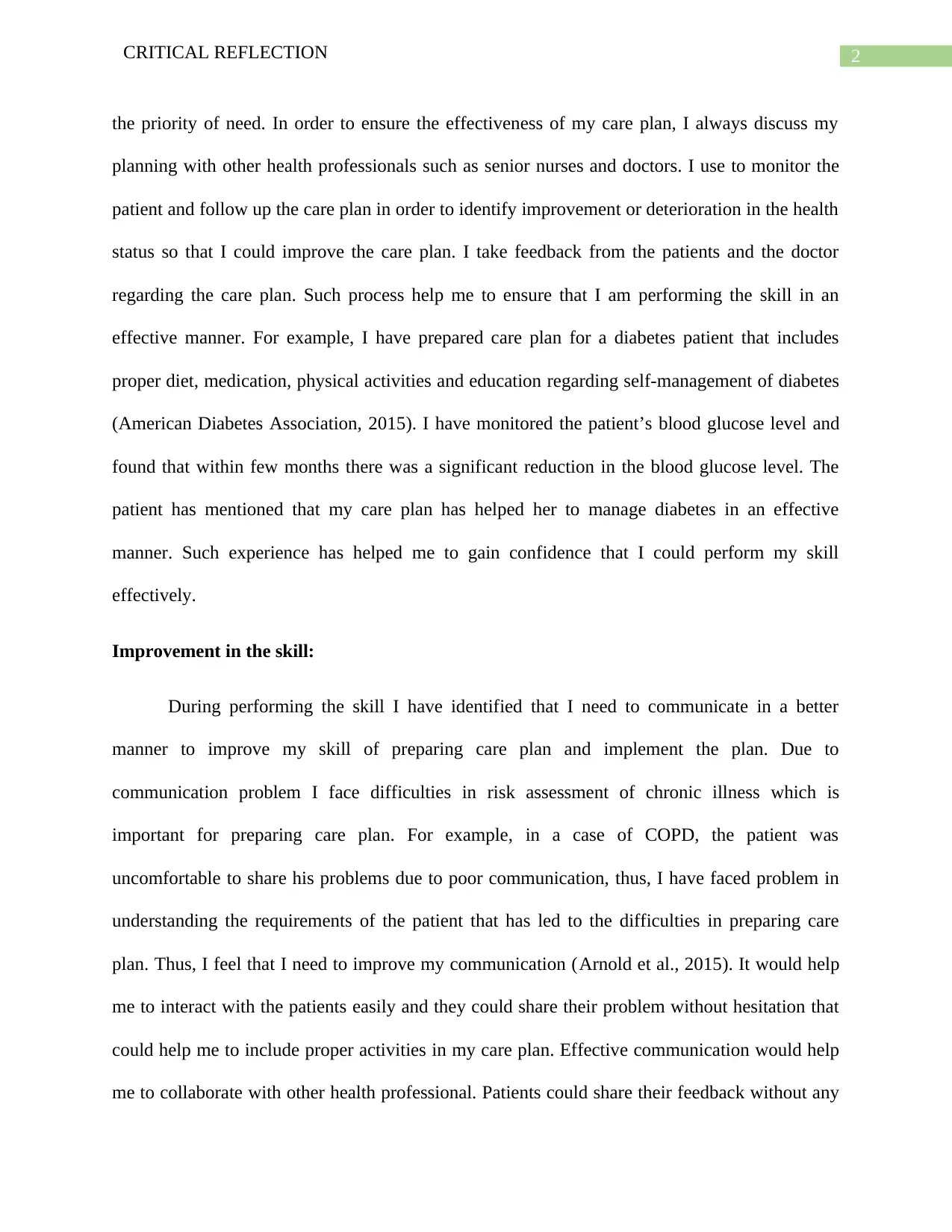
2CRITICAL REFLECTION
the priority of need. In order to ensure the effectiveness of my care plan, I always discuss my
planning with other health professionals such as senior nurses and doctors. I use to monitor the
patient and follow up the care plan in order to identify improvement or deterioration in the health
status so that I could improve the care plan. I take feedback from the patients and the doctor
regarding the care plan. Such process help me to ensure that I am performing the skill in an
effective manner. For example, I have prepared care plan for a diabetes patient that includes
proper diet, medication, physical activities and education regarding self-management of diabetes
(American Diabetes Association, 2015). I have monitored the patient’s blood glucose level and
found that within few months there was a significant reduction in the blood glucose level. The
patient has mentioned that my care plan has helped her to manage diabetes in an effective
manner. Such experience has helped me to gain confidence that I could perform my skill
effectively.
Improvement in the skill:
During performing the skill I have identified that I need to communicate in a better
manner to improve my skill of preparing care plan and implement the plan. Due to
communication problem I face difficulties in risk assessment of chronic illness which is
important for preparing care plan. For example, in a case of COPD, the patient was
uncomfortable to share his problems due to poor communication, thus, I have faced problem in
understanding the requirements of the patient that has led to the difficulties in preparing care
plan. Thus, I feel that I need to improve my communication (Arnold et al., 2015). It would help
me to interact with the patients easily and they could share their problem without hesitation that
could help me to include proper activities in my care plan. Effective communication would help
me to collaborate with other health professional. Patients could share their feedback without any
the priority of need. In order to ensure the effectiveness of my care plan, I always discuss my
planning with other health professionals such as senior nurses and doctors. I use to monitor the
patient and follow up the care plan in order to identify improvement or deterioration in the health
status so that I could improve the care plan. I take feedback from the patients and the doctor
regarding the care plan. Such process help me to ensure that I am performing the skill in an
effective manner. For example, I have prepared care plan for a diabetes patient that includes
proper diet, medication, physical activities and education regarding self-management of diabetes
(American Diabetes Association, 2015). I have monitored the patient’s blood glucose level and
found that within few months there was a significant reduction in the blood glucose level. The
patient has mentioned that my care plan has helped her to manage diabetes in an effective
manner. Such experience has helped me to gain confidence that I could perform my skill
effectively.
Improvement in the skill:
During performing the skill I have identified that I need to communicate in a better
manner to improve my skill of preparing care plan and implement the plan. Due to
communication problem I face difficulties in risk assessment of chronic illness which is
important for preparing care plan. For example, in a case of COPD, the patient was
uncomfortable to share his problems due to poor communication, thus, I have faced problem in
understanding the requirements of the patient that has led to the difficulties in preparing care
plan. Thus, I feel that I need to improve my communication (Arnold et al., 2015). It would help
me to interact with the patients easily and they could share their problem without hesitation that
could help me to include proper activities in my care plan. Effective communication would help
me to collaborate with other health professional. Patients could share their feedback without any
⊘ This is a preview!⊘
Do you want full access?
Subscribe today to unlock all pages.

Trusted by 1+ million students worldwide
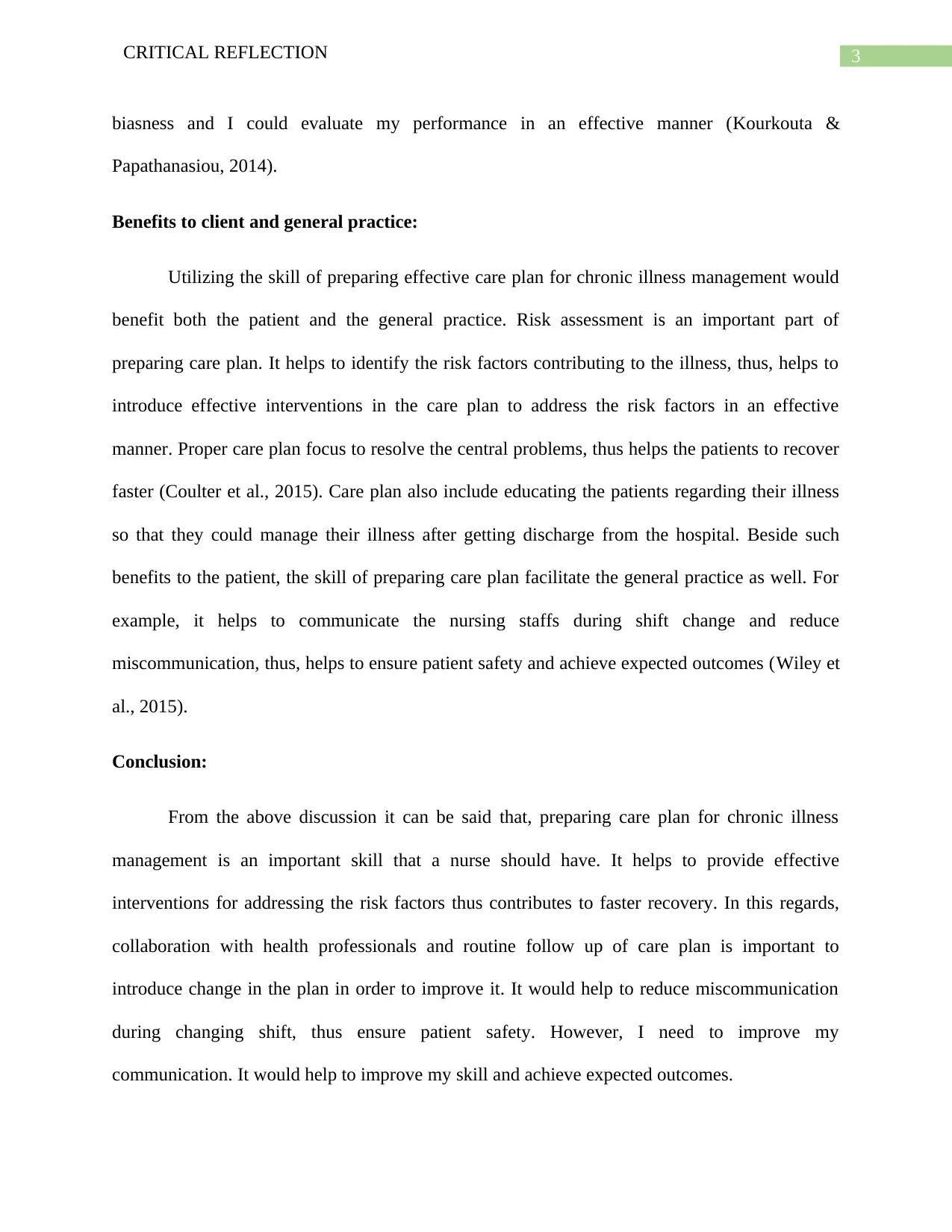
3CRITICAL REFLECTION
biasness and I could evaluate my performance in an effective manner (Kourkouta &
Papathanasiou, 2014).
Benefits to client and general practice:
Utilizing the skill of preparing effective care plan for chronic illness management would
benefit both the patient and the general practice. Risk assessment is an important part of
preparing care plan. It helps to identify the risk factors contributing to the illness, thus, helps to
introduce effective interventions in the care plan to address the risk factors in an effective
manner. Proper care plan focus to resolve the central problems, thus helps the patients to recover
faster (Coulter et al., 2015). Care plan also include educating the patients regarding their illness
so that they could manage their illness after getting discharge from the hospital. Beside such
benefits to the patient, the skill of preparing care plan facilitate the general practice as well. For
example, it helps to communicate the nursing staffs during shift change and reduce
miscommunication, thus, helps to ensure patient safety and achieve expected outcomes (Wiley et
al., 2015).
Conclusion:
From the above discussion it can be said that, preparing care plan for chronic illness
management is an important skill that a nurse should have. It helps to provide effective
interventions for addressing the risk factors thus contributes to faster recovery. In this regards,
collaboration with health professionals and routine follow up of care plan is important to
introduce change in the plan in order to improve it. It would help to reduce miscommunication
during changing shift, thus ensure patient safety. However, I need to improve my
communication. It would help to improve my skill and achieve expected outcomes.
biasness and I could evaluate my performance in an effective manner (Kourkouta &
Papathanasiou, 2014).
Benefits to client and general practice:
Utilizing the skill of preparing effective care plan for chronic illness management would
benefit both the patient and the general practice. Risk assessment is an important part of
preparing care plan. It helps to identify the risk factors contributing to the illness, thus, helps to
introduce effective interventions in the care plan to address the risk factors in an effective
manner. Proper care plan focus to resolve the central problems, thus helps the patients to recover
faster (Coulter et al., 2015). Care plan also include educating the patients regarding their illness
so that they could manage their illness after getting discharge from the hospital. Beside such
benefits to the patient, the skill of preparing care plan facilitate the general practice as well. For
example, it helps to communicate the nursing staffs during shift change and reduce
miscommunication, thus, helps to ensure patient safety and achieve expected outcomes (Wiley et
al., 2015).
Conclusion:
From the above discussion it can be said that, preparing care plan for chronic illness
management is an important skill that a nurse should have. It helps to provide effective
interventions for addressing the risk factors thus contributes to faster recovery. In this regards,
collaboration with health professionals and routine follow up of care plan is important to
introduce change in the plan in order to improve it. It would help to reduce miscommunication
during changing shift, thus ensure patient safety. However, I need to improve my
communication. It would help to improve my skill and achieve expected outcomes.
Paraphrase This Document
Need a fresh take? Get an instant paraphrase of this document with our AI Paraphraser

4CRITICAL REFLECTION
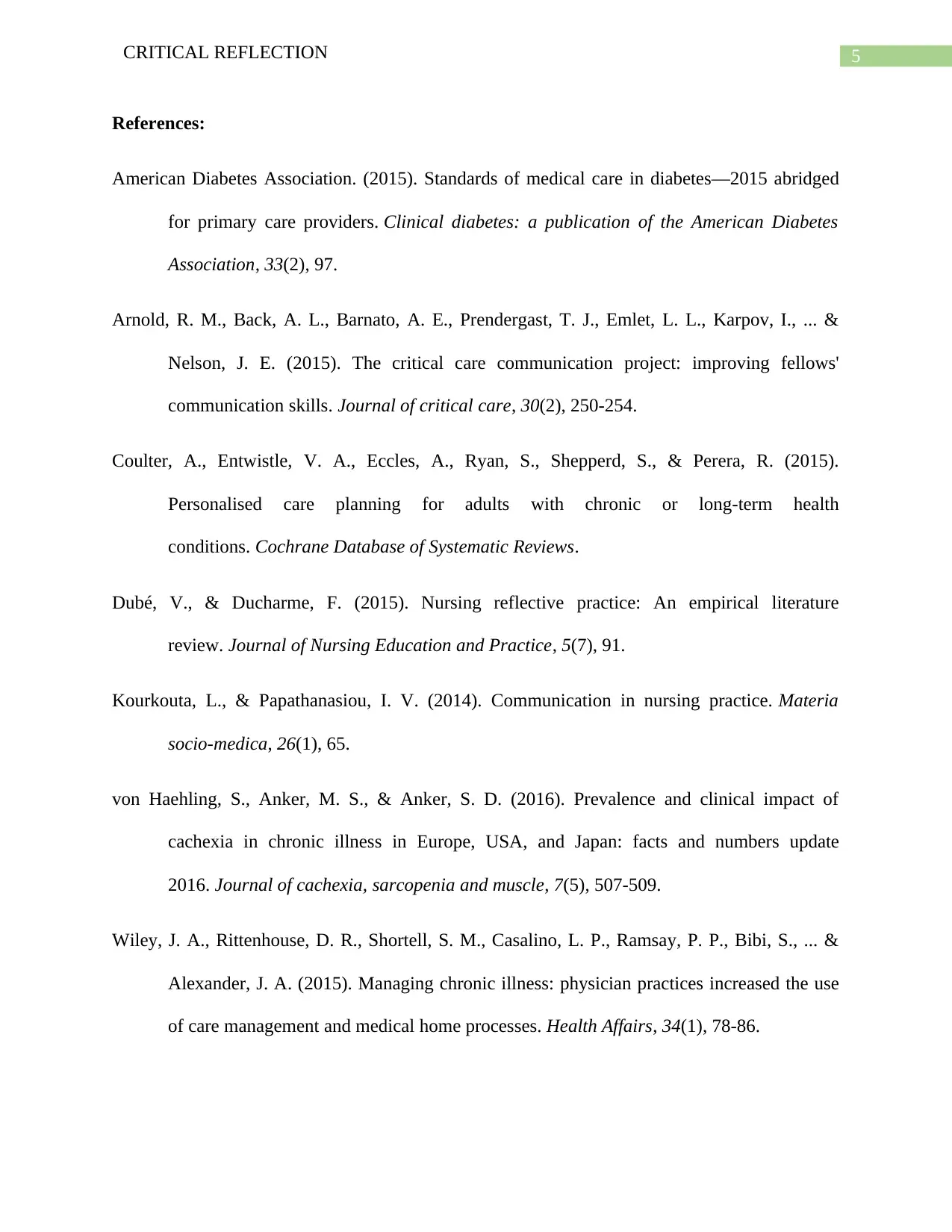
5CRITICAL REFLECTION
References:
American Diabetes Association. (2015). Standards of medical care in diabetes—2015 abridged
for primary care providers. Clinical diabetes: a publication of the American Diabetes
Association, 33(2), 97.
Arnold, R. M., Back, A. L., Barnato, A. E., Prendergast, T. J., Emlet, L. L., Karpov, I., ... &
Nelson, J. E. (2015). The critical care communication project: improving fellows'
communication skills. Journal of critical care, 30(2), 250-254.
Coulter, A., Entwistle, V. A., Eccles, A., Ryan, S., Shepperd, S., & Perera, R. (2015).
Personalised care planning for adults with chronic or long-term health
conditions. Cochrane Database of Systematic Reviews.
Dubé, V., & Ducharme, F. (2015). Nursing reflective practice: An empirical literature
review. Journal of Nursing Education and Practice, 5(7), 91.
Kourkouta, L., & Papathanasiou, I. V. (2014). Communication in nursing practice. Materia
socio-medica, 26(1), 65.
von Haehling, S., Anker, M. S., & Anker, S. D. (2016). Prevalence and clinical impact of
cachexia in chronic illness in Europe, USA, and Japan: facts and numbers update
2016. Journal of cachexia, sarcopenia and muscle, 7(5), 507-509.
Wiley, J. A., Rittenhouse, D. R., Shortell, S. M., Casalino, L. P., Ramsay, P. P., Bibi, S., ... &
Alexander, J. A. (2015). Managing chronic illness: physician practices increased the use
of care management and medical home processes. Health Affairs, 34(1), 78-86.
References:
American Diabetes Association. (2015). Standards of medical care in diabetes—2015 abridged
for primary care providers. Clinical diabetes: a publication of the American Diabetes
Association, 33(2), 97.
Arnold, R. M., Back, A. L., Barnato, A. E., Prendergast, T. J., Emlet, L. L., Karpov, I., ... &
Nelson, J. E. (2015). The critical care communication project: improving fellows'
communication skills. Journal of critical care, 30(2), 250-254.
Coulter, A., Entwistle, V. A., Eccles, A., Ryan, S., Shepperd, S., & Perera, R. (2015).
Personalised care planning for adults with chronic or long-term health
conditions. Cochrane Database of Systematic Reviews.
Dubé, V., & Ducharme, F. (2015). Nursing reflective practice: An empirical literature
review. Journal of Nursing Education and Practice, 5(7), 91.
Kourkouta, L., & Papathanasiou, I. V. (2014). Communication in nursing practice. Materia
socio-medica, 26(1), 65.
von Haehling, S., Anker, M. S., & Anker, S. D. (2016). Prevalence and clinical impact of
cachexia in chronic illness in Europe, USA, and Japan: facts and numbers update
2016. Journal of cachexia, sarcopenia and muscle, 7(5), 507-509.
Wiley, J. A., Rittenhouse, D. R., Shortell, S. M., Casalino, L. P., Ramsay, P. P., Bibi, S., ... &
Alexander, J. A. (2015). Managing chronic illness: physician practices increased the use
of care management and medical home processes. Health Affairs, 34(1), 78-86.
⊘ This is a preview!⊘
Do you want full access?
Subscribe today to unlock all pages.

Trusted by 1+ million students worldwide
1 out of 6
Related Documents
Your All-in-One AI-Powered Toolkit for Academic Success.
+13062052269
info@desklib.com
Available 24*7 on WhatsApp / Email
![[object Object]](/_next/static/media/star-bottom.7253800d.svg)
Unlock your academic potential
Copyright © 2020–2026 A2Z Services. All Rights Reserved. Developed and managed by ZUCOL.




